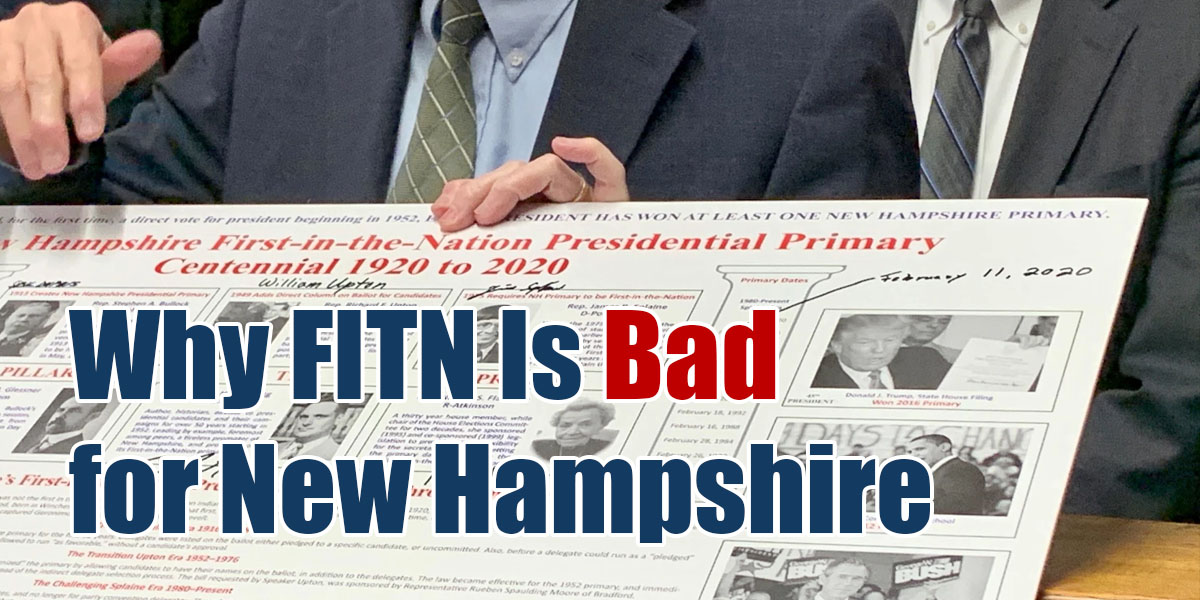In NH, it’s sacrilegious (not to mention crazy) to suggest that its First In The Nation (FITN) primary is anything other than a national treasure and your sacred duty to nurture and protect. But I think we’d be far better off without its distortive influence.
TL;DR – Here are 4 reasons why the FITN is bad for New Hampshire:
- It shifts party leaders’ priorities from electing NH candidates to controlling access because everybody wants some.
- The distortion results in a circling of the wagons that centralizes power, discouraging grassroots activism and hampering innovation.
- It promotes a horse-trading system for Washington DC favors.
- The economic and political advantages it used to deliver are severely curtailed if not gone.
I’ll expand on these points in this post, but first, here’s some background on the FITN for the uninitiated.
Stranglehold: A Brief History of the FITN

For a long history of the FITN, I recommend listening to the NHPR podcast Stranglehold. While it has a clear agenda to paint everything with a racism brush, it provides a rich history of the tradition and does an excellent job of setting the context for today’s incentive structures.
While NH has been the first state to vote in presidential primaries since the 1920s, it became political folklore with Jimmy Carter’s campaign in 1976.
“There’s a good argument to be made that 1976 was a defining moment in New Hampshire’s political history. This campaign changed people’s lives in a way that previous primaries hadn’t. Many of the NH staffers on the Carter campaign would go on to incredibly powerful political careers; not just here but in Washington. And so in 1976, it was clear. This first in the nation primary thing? Forget the candidates. For local politicos, it could be their ticket to power.”
“The Dragon Egg” epsidode from NHPR’s Stranglehold podcast
The fairy tale cover story you hear from politicos on both sides of the aisle in NH and across the country is about so-called “retail politics.” They’ve romanticized the notion that NH’s small population and Yankee pragmatism short-circuit the national establishment, providing long-shot hopefuls with an opportunity to win the presidency by donning flannel shirts and crisscrossing the state in a pickup truck. And there’s a lot of truth to that. There’s a very reasonable argument to be made that without NH, Jimmy Carter, George H.W. Bush, Bill Clinton, and Barack Obama would never have been president.
But more importantly for NH, without the FITN, there likely would not have been U.S. Attorney Bill Shaheen, White House Chief of Staff John Sununu, US Ambassador Terry Shumaker, Senator Ann McLane Kuster, or presidential advisor Corey Lewandowski. And let’s not leave out reporters like Karl Cameron or James Pindell. Their careers would probably look very different without the FITN.
Until 1976, nobody paid much attention or cared very much about who voted first in the presidential primary. All that changed in 1976 when candidates saw a shortcut to the presidency and politicos saw a shortcut to power. Now everybody wants some.
1. Everybody Wants Some
In the Wizard of Oz, Glinda the good witch warns Dorothy, “Keep tight inside of [those magic slippers]. Their magic must be very powerful, or she wouldn’t want them so badly.” For NH politicos, the FITN is a metaphorical pair of glass slippers.
Let’s pause for a moment to define the word “politicos.” I’m using it to refer to anyone directly or indirectly involved in NH elections. This includes party leaders and staffers, high-level elected officials, government bureaucrats, political consultants, and even reporters. Many of their fortunes are directly tied to FITN.
So long as politicos have access to the Ruby Slippers, their decisions will be heavily influenced, if not dictated, by them. Party leaders are a little less concerned about winning elections and journalists are a little less concerned about reporting. If their actions might result in losing access to the slippers, they will be hesitant to take those actions to say the least.
But instead of speaking in metaphors, let’s get specific about the source of that magic – access.
The Supply and Demand of Access
Presidential candidates want access to the “power brokers” in NH, and the power brokers want access to the spoils of war. Many of the apparatchiks and consultants in NH want to be the next Bill Shaheen or Corey Lewandowski to catch a tiger by the tail and ride it to The Big DC Payout. As a result, they are incentivized to keep that access as limited as possible. It’s supply and demand; the easier it is for candidates to get access, the less it’s worth. So they need to keep the supply low.
2. Circle the Wagons
The net effect of this is to consciously or even subconsciously build walls around the power structures. Grassroots activists are blocked out of the system because (many, not all) leaders are more interested in controlling the supply and demand balance of access than winning elections. The more people they allow into the tent, the less their access is worth.
Institutions vs. Collaboration
Politicos become gatekeepers instead of facilitators. You might ask, “So what?” I answered that question 4 years ago after the last mid-term underperformance by Republicans.
The Internet isn’t a decoration on contemporary society. It’s a challenge to it. A society that has an Internet is different from a society that doesn’t, in the same way that a society that has a printing press is different from a society that doesn’t.
Clay Shirky

Institutions came about to solve a coordination problem. “Groups get complicated faster than they get large,” says Shirky, and the institutional solution to that problem is a hierarchy. “Because the cost of letting groups communicate with each other has fallen through the floor…,” argues Shirky, “there has been a second answer which is to put the cooperation into the infrastructure.”
Circling the wagons and maintaining a hierarchical party structure is counterproductive to winning elections in the digital age. FITN incentivizes politicos to remove cooperation from the infrastructure.
Poisoning the Grassroots
With 400 members, New Hampshire’s lower chamber is the third-largest legislative body in the world, behind only the United Kingdom’s 650-member House of Commons and the 435 members that comprise the US House of Representatives.
James Pindell, Boston Globe
Our House of Representatives is a truly grassroots, representative body. When you combine its size with our governor’s relative impotence, power is widely dispersed in our state. This is a good thing. It means there are very few gatekeepers and disincentivizes power grabs because power is very hard to come by.
Except when it comes to the FITN. Eliminating that influence would drastically reduce the incentive against cooperation.
3. DC Horse Trading
Horse trading is how politics gets done. It’s not inherently wrong, and it’s not going away. However, the FITN sets up a horse trading pipeline between NH and Washington, DC, which I argue is not in the state’s best interest. During our nearly two-year presidential election cycles, much of the work done in the state comes with the implicit expectation of payback in the form of a Washington, DC opportunity. This places national priorities ahead of New Hampshire’s.
4. Debunking the Advantages
You’ll hear three main arguments in favor of the FITN.
- Retail politics serves the nation well.
- It’s a cash cow for the state.
- It allows NH to punch above its weight politically.
I don’t disagree with the first point. I do think NH takes its responsibility seriously and does a good job vetting candidates. And let’s be honest; it’s a lot of fun. You have to go out of your way NOT to meet a future president in New Hampshire.
But I’d argue that this aspect is becoming outdated. As we saw with the Biden campaign in 2020, NH’s influence is waning. And selfishly, as the country goes to hell, I’m far more concerned about NH than Washington.
FITN as Cash Cow
While this used to be true, it’s far less true today because of economic consolidation. Most of the money goes to Hearst Television in California, iHeartMedia in Texas, Boston TV and Radio stations, Washington DC consultants, and international hotel chains. Much less of it goes into the pockets of NH residents. It’s still a net gain for the state, but we could live without it, and I’d argue the long-term gains in prosperity from a better-functioning political system would outweigh this occasional sugar high.
Political Clout
This is another relic of a bygone era. The FITN used to be a Sword of Damocles that helped NH wield power it otherwise wouldn’t have. This, too, is waning. Politics is becoming less about the candidate and more about the party. Every election is an existential fight to the death between good and evil (my party is good, yours is evil). Biden showed you could win without NH, which revealed a crack in those Ruby Slippers. Candidates won’t feel as obligated to pander to NH voters, and the swamp will eat up any citizens we send there.
Conclusion
The FITN is like a black hole that exerts an inescapable gravitational force on NH politics, bending space and time. It puts incentives in the wrong places and distracts leaders from their primary responsibility to govern our state. Losing this privilege won’t solve all of our problems but it would remove one very large obstacle.


I really liked this piece, saw it on The Bastion. Thanks for writing it, hope to see more.
Thanks! A new article is in the queue.